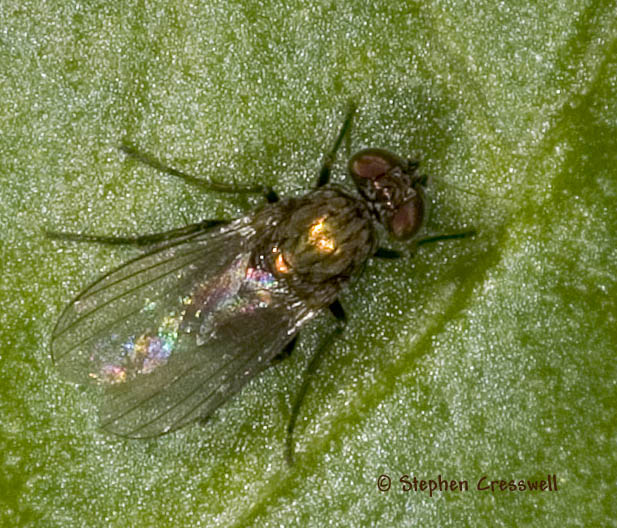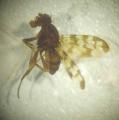Diptera.info :: Identification queries :: Diptera (adults)
Who is here? 1 guest(s)
|
What simple wing venation!
|
|
| Stephen |
Posted on 15-07-2006 23:12
|
|
Member Location: West Virginia USA Posts: 1322 Joined: 12.04.05 |
I am trying to pay more attention to the pattern of veins in the wings. I can't recall seeing a fly with such straight veins?and few of them. ID help appreciated. Found in a damp woodland near the Ohio River, West Virginia, USA, 13 June 2006. My recollection is that the overall length was circa 3.33 mm, but I am not certain about this. Stephen attached the following image:  [122.67Kb] --Stephen Stephen Cresswell www.americaninsects.net |
| Nikita Vikhrev |
Posted on 15-07-2006 23:18
|
|
Member Location: Moscow, Russia Posts: 9536 Joined: 24.05.05 |
Hi Stephen. Yes, simple venation, Dolichopodidae. Nikita Nikita Vikhrev - Zool Museum of Moscow University |
|
|
|
| Kahis |
Posted on 16-07-2006 08:23
|
|
Member Location: Helsinki, Finland Posts: 1999 Joined: 02.09.04 |
This is barely a guess, but the fly may be a female of genus Diaphorus (Dolichopodidae). Kahis |
| Paul Beuk |
Posted on 16-07-2006 13:28
|
|
Super Administrator Location: Netherlands Posts: 19403 Joined: 11.05.04 |
Why not Chrysotus?
Paul - - - - Paul Beuk on https://diptera.info |
| Stephen |
Posted on 16-07-2006 14:24
|
|
Member Location: West Virginia USA Posts: 1322 Joined: 12.04.05 |
Just so I can learn more about how to identify fly familes, what characteristics make this fly a member of Dolichopodidae?
--Stephen Stephen Cresswell www.americaninsects.net |
| Kahis |
Posted on 16-07-2006 17:13
|
|
Member Location: Helsinki, Finland Posts: 1999 Joined: 02.09.04 |
Paul Beuk wrote: Why not Chrysotus? Well, I'm not saying it isn't, but a) The 3rd segment appears to be very short, not larger than previous segments. Admittably they are out-of-focus and perhaps they are damaged and the postpedicel is missing.  >3 mm is rather large for a Chrysotus (at least in Europe) but a perfectly normal size for Diaphorus. >3 mm is rather large for a Chrysotus (at least in Europe) but a perfectly normal size for Diaphorus. c) It does not feel like a Chrysotus. Don't ask why 
Kahis |
| Kahis |
Posted on 16-07-2006 17:26
|
|
Member Location: Helsinki, Finland Posts: 1999 Joined: 02.09.04 |
Stephen wrote: Just so I can learn more about how to identify fly familes, what characteristics make this fly a member of Dolichopodidae? A small fly with metallic green color (obscured by pollinosity to a varying degree) is a prime candidate for a Doli. Similar color is found in few other familes, mostly on very small, pudgy flies (Melagromyza in Agromyzidae, Psilopa in Ephydridae and others) - and of course on bluebottles and greenbottles  The simple wing venation is shared by all classical Dolies; just four long major veins (two radial veins, one medial, one cubital) and one crossvein (m-cu) in the outer part of the wing. Technically dolies have also the 'r-m' crossvein, but it is near the base of wing, not in the middle as in most other flies. So practically dolies have only one major crossvein. Some dolies are not metallic but yellow; for them the wing venation is the primary reference point. Kahis |
| Nikita Vikhrev |
Posted on 16-07-2006 18:35
|
|
Member Location: Moscow, Russia Posts: 9536 Joined: 24.05.05 |
In Russian Dolichopodidae - Zelenushki, which may be translated as small greenish flies
Nikita Vikhrev - Zool Museum of Moscow University |
|
|
|
| Jump to Forum: |













